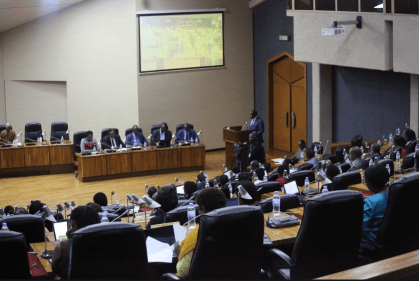Rwanda’s Cooperative Bank For 2020

The long awaited Cooperative Bank which is expected to alleviate the burden of interest rate among the small and medium enterprises and boost investment is officially scheduled for the next fiscal year; 2019-2020.
At the Rwandan Parliament today, Minister Uzziel Ndagijimana of Finance and Economic Planning presented government plan to launch this bank among the key priorities in the next financial year’s budget.
The budget, worth Rwf 2.8 trillion of which domestic resources account for Rwf 1.9 trillion representing 68.3% of the entire budget will dedicate the biggest portion to development projects.
Rwf 1.1 trillion will be spent on among others, expanding the Rwanda’s National carrier – RwandAir, increase access to electricity through local and regional projects.
The government will also bet in dairy – a sector which caused controversies a couple of weeks ago, after the head of State discovered that government enterprises invested in some of them, only to see them fail.
Infrastructure will dominate this sector, but the banking sector was not left out neither.
Minister Ndagijimana said that among the key projects include “starting a bank that will include all cooperatives.”
The cooperative bank was pledged by President Paul Kagame during a meeting with 2500 members of cooperatives in July 2014. However, in a series of stories KT Press wrote thereafter, officials quoted lack of major shareholders to raise required capital for the bank to start.
The bank would require an initial investment of Rwf5 billion ($7 million).
The Rwanda Cooperative Agency (RCA) an umbrella of all cooperatives in the country, said the investor would be offered 40% (Rwf2 billion) stake.
However, officials at RCA told KT Press that the cooperatives mobilized the 60% capital needed.
Also in the banking, Ndagijimana said that the Credit and Saving Cooperatives (Umurenge Saccos) will be merged at the district level.
Since 2017, efforts to automate all Saccos established in every sector entity of the country yielded no result. In 2018, the government terminated contract with a Kenyan company that was hired to automate them because it had failed.

CCTV Cameras, Mobile Bridges
While a lot is planned in infrastructure, more is also coming to guarantee security for whatever the country will achieve.
For example, the country will spend Rwf 5 billion in installing security cameras along selected roads.
A rare project to be heard in the budget was also a plan to build “two mobile bridges that would help in emergency situation.”
The bridges were budgeted for Rwf4.3 billion.
The country is also waiting for any concluding report that would confirm whether Rwanda really has petrol underground.
Rwf1 billion was budgeted to do research on natural resources available in Rwanda. (Source/ KTPress)








